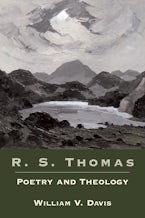
R. S. Thomas
Poetry and Theology
Imprint: Baylor University Press
Sales Date: 2007-08-22
235 Pages, 6.00 x 9.00 x 0.68 in
For Professors: Exam Copies

Imprint: Baylor University Press
Sales Date: 2007-08-22
235 Pages, 6.00 x 9.00 x 0.68 in
For Professors: Exam Copies